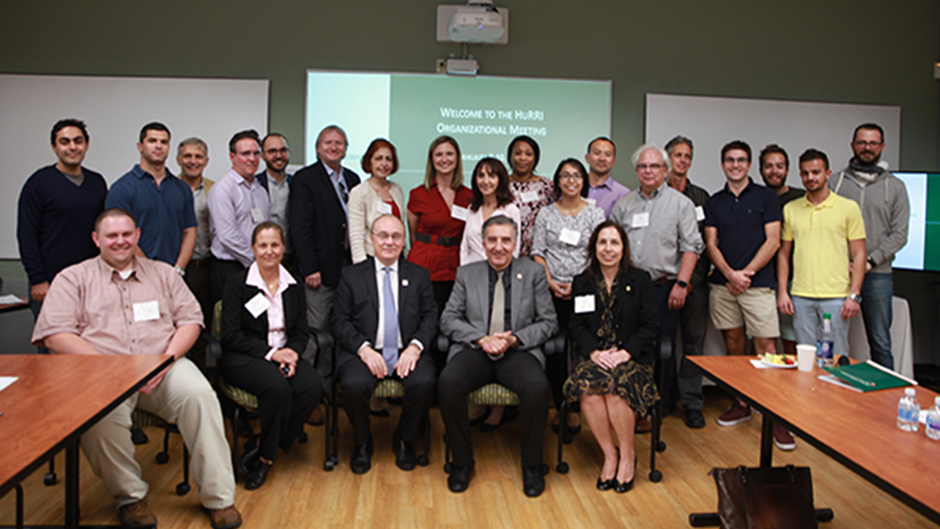On January 9 and 10, the University of Miami College of Engineering (UMCoE) hosted an organizational meeting for the Hurricane Resilience Research Institute (HuRRI), a multi-state, multi-organization national center of excellence seeking to advance the nation’s ability to mitigate, assess, predict, protect, educate and recover from hurricanes and severe storms with the purpose of creating and sustaining resilient communities.
“The recent hurricane disasters experienced in the U.S. with Harvey, Irma and Maria only confirm the dire need for an integrated and multi-state approach to hurricane resilience,” explains Jean-Pierre Bardet, dean of UMCoE. “Especially given the prevalence of hurricanes and severe storms as the most numerous, costliest and deadliest natural disasters in the United States.”
Leadership and experts from six distinguished universities – University of Houston (UH), Texas Tech University, University of Texas at Tyler, Louisiana State University, University of Florida and UM – discussed current and future activities at their respective institutions in order to continue to foster intercollegiate and interdisciplinary collaborations as well as research projects.
At the event, each member institution reviewed their own initiatives in research, education and innovation. For example, a few of the ongoing initiatives at UM include: the UM College of Engineering’s research in constructing smart coastlines to build resilient coastal communities, the UM School of Architecture’s work on innovative sustainable housing projects that will mitigate losses from future hurricanes and sea level rise, and the UM School of Communication’s improvements on information and knowledge transfer to the public – and communities – subject to hurricane risk.
The two-day event also consisted of faculty presentations at the UMCoE, UM College of Arts and Sciences, and UM Rosenstiel School of Marine and Atmospheric Science. The UM faculty presentations included lectures and speeches by Helena Solo-Gabriele, professor and associate dean of research and professor in CAE; Antonio Nanni, professor and chair of CAE; and Brian Haus, professor and chair of the Department of Ocean Sciences.
A few of the interdisciplinary and intercollegiate HuRRI Supporting Effective Educator Development (SEED) projects also presented at the event, including “HuRRI-Composites: Resilient Coastal Communities Using Advanced Construction Materials and Systems” by Nanni, among others; and “The Aftermath of Hurricanes: Pathways to Resilience and Recovery Among College Students” by Annette Marie La Greca, professor and director of clinical training in the UM Department of Psychology, and Rodica Damian, assistant professor of social psychology at the University of Houston.
Among those who attended were Hanadi Rifai, associate dean of research and facilities of the Cullen College of Engineering at the University of Houston; Danny Reible, Donovan Maddox Distinguished Engineering Chair at Texas Tech University; John Pardue, Elizabeth Howell Stewart Endowed Professor at Louisiana State University; Michael Gangone, associate professor at the University of Texas at Tyler; Tim Murtha, associate professor in the College of Design, Construction, and Planning at the University of Florida; as well as Executive Vice President for Academic Affairs & Provost Jeffrey Duerk; UM College of Engineering Dean Jean-Pierre Bardet and UM Rosenstiel School of Marine and Atmospheric Science Dean Roni Avissar.
Currently, the HuRRI leadership is in the process of submitting a pre-proposal for a National Science Foundation Engineering Research Center Grant, which would allow HuRRI to have a lasting legacy on hurricane preparedness and policy in the U.S.
Moving forward, HuRRI intends to catalyze innovation in mitigation, assessment, prediction, protection, education and recovery from hurricanes and severe storms, ultimately becoming a national leader that influences hurricane policies, funding and management nationwide, as well as making significant strides toward resilience of the communities affected by hurricanes, especially those along the Gulf Coast.
“The main goal of HuRRI is to change the paradigm from wait-and-pay to system-wide anticipate-and-accommodate to save lives and reduce damage and costs associated with natural disasters,” says Derin Ural, associate dean for student affairs and professor in practice in the UMCoE’s Department of Civil, Architectural and Environmental Engineering (CAE). “These universities are uniquely situated to carry out this goal: we have experienced professors, advanced degree programs, relationships with non-profits and industry, and locations subject to frequent flooding and devastating storms.”
To learn more about HuRRI and its research, please click here.

